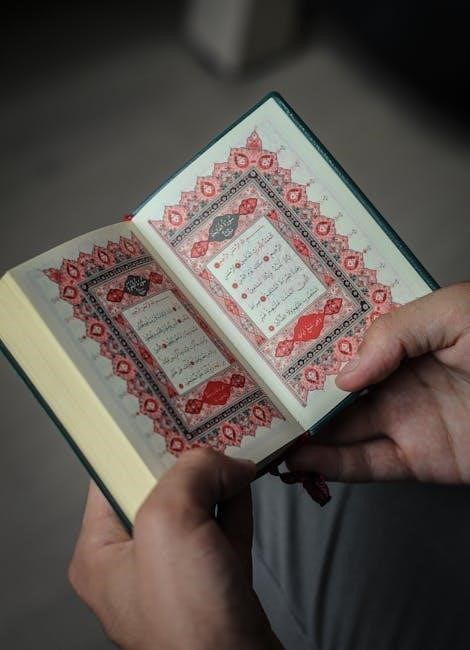Overview of the Norton Anthology of African American Literature
The Norton Anthology of African American Literature is a comprehensive collection of works by 123 African American writers from 1746 to the present. It includes diverse genres‚ vernacular forms‚ and historical documents‚ offering a rich exploration of African American cultural and literary heritage. Widely used in academic settings‚ the anthology is edited by scholars like Henry Louis Gates Jr. and Valerie Smith‚ ensuring its scholarly depth and relevance.
Historical Background and Significance
The Norton Anthology of African American Literature traces the rich literary heritage of African American writers from 1746 to the present. It captures the evolving African American experience‚ from slavery and freedom to modern-day identity and culture. First published in 1997‚ the anthology has become a foundational text in academic and literary circles‚ offering a chronological exploration of African American voices. Its significance lies in preserving and celebrating the diverse narratives that have shaped American history and culture. The anthology also highlights the influence of key historical movements‚ such as the Harlem Renaissance and the Civil Rights era‚ on African American literary expression. As a scholarly resource‚ it provides critical insights into the social‚ political‚ and cultural contexts of African American life‚ making it indispensable for understanding the nation’s shared heritage.
Key Features and Structure of the Anthology
The Norton Anthology of African American Literature is organized chronologically‚ spanning from 1746 to the present. It features over 100 works in Volume 1 alone‚ covering genres like poetry‚ prose‚ drama‚ and vernacular forms such as spirituals and folktales. The anthology includes works by 123 writers‚ offering a diverse representation of African American voices. Key features include historical context‚ critical essays‚ and biographical sketches‚ enriching the reader’s understanding. The third edition introduces fresh scholarship‚ visuals‚ and media‚ enhancing its educational value. The structure is divided into sections that reflect major historical periods‚ such as slavery‚ freedom‚ and the Harlem Renaissance‚ making it a comprehensive resource for studying African American literary history and cultural expression.

Editors and Their Contributions
The editors‚ including Henry Louis Gates Jr. and Valerie Smith‚ have curated a diverse selection of African American literature‚ providing critical context and scholarly insights.
Henry Louis Gates Jr. and Valerie Smith
Henry Louis Gates Jr. and Valerie Smith are renowned scholars who co-edited The Norton Anthology of African American Literature. Gates‚ a literary critic and historian‚ is celebrated for his work on African American literature and culture. Smith‚ a specialist in African American and American studies‚ brings a deep understanding of race‚ gender‚ and identity. Together‚ they curated a diverse selection of texts‚ ensuring the anthology reflects the richness and complexity of African American literary traditions. Their contributions include fresh perspectives on canonical works and the inclusion of lesser-known voices‚ making the anthology a vital resource for students and scholars. Their collaboration has significantly shaped the study of African American literature‚ offering a comprehensive and inclusive representation of its history and evolution.
Nellie Y. McKay and Deborah E. McDowell
Nellie Y. McKay and Deborah E. McDowell are distinguished scholars and editors who played pivotal roles in shaping The Norton Anthology of African American Literature. McKay‚ a prominent figure in African American literary studies‚ focused on expanding the anthology’s inclusivity‚ ensuring diverse voices were represented. McDowell‚ known for her work on race‚ gender‚ and cultural studies‚ contributed significantly to the anthology’s structure and thematic organization. Together‚ they emphasized the importance of vernacular forms and historical context‚ enriching the anthology’s depth. Their collaborative efforts helped bridge gaps in the literary canon‚ showcasing the breadth of African American literary expression. Their contributions remain essential to the anthology’s enduring relevance in academic and cultural discourse.
Notable Authors and Their Works
The anthology features seminal works by Phillis Wheatley‚ Frederick Douglass‚ and Harriet Jacobs‚ alongside modern giants like Toni Morrison‚ Alice Walker‚ and Maya Angelou. Their writings illuminate themes of slavery‚ freedom‚ and identity‚ showcasing the profound literary legacy of African American authors.
Phillis Wheatley‚ Frederick Douglass‚ and Harriet Jacobs
Phillis Wheatley‚ the first African American woman poet‚ is celebrated for her elegies and patriotic verses‚ reflecting her unique voice in early American literature. Frederick Douglass‚ a former slave‚ authored the influential Narrative of the Life of Frederick Douglass‚ exposing the brutality of slavery and advocating for abolition. Harriet Jacobs‚ in Incidents in the Life of a Slave Girl‚ courageously revealed the horrors of slavery from a female perspective‚ emphasizing the resilience of African American women. Their works‚ included in the anthology‚ provide profound insights into the African American experience‚ blending personal narratives with broader social commentary. These authors’ contributions remain pivotal in understanding the historical and cultural context of African American literature.
Toni Morrison‚ Alice Walker‚ and Maya Angelou
Toni Morrison‚ Alice Walker‚ and Maya Angelou are towering figures in African American literature‚ each contributing uniquely to the genre. Toni Morrison‚ a Nobel laureate‚ is celebrated for novels like Beloved‚ which hauntingly explores the trauma of slavery and its aftermath. Alice Walker gained acclaim with The Color Purple‚ a powerful narrative of female resilience and racial oppression. Maya Angelou‚ renowned for her autobiographical works‚ shares unflinching truths about identity and race in I Know Why the Caged Bird Sings. Their works‚ featured in the anthology‚ offer profound insights into the African American experience‚ blending lyrical prose with unflinching honesty. Their writings continue to resonate‚ inspiring new generations to confront the complexities of race‚ gender‚ and resilience.

Themes and Genres Covered
The anthology explores themes of slavery‚ freedom‚ and the African American experience‚ blending genres like folklore‚ spirituals‚ blues‚ and vernacular traditions to reflect cultural and social contexts.
Slavery‚ Freedom‚ and the African American Experience
The Norton Anthology of African American Literature delves deeply into the themes of slavery‚ freedom‚ and the African American experience‚ tracing their evolution from the 18th century to modern times. Works by authors like Phillis Wheatley‚ Frederick Douglass‚ and Harriet Jacobs provide personal narratives of enslavement and the struggle for liberation. The anthology also includes spirituals and folklore‚ which served as forms of resistance and cultural preservation. These texts highlight the resilience and agency of African Americans‚ offering a nuanced exploration of identity‚ oppression‚ and the enduring quest for freedom. By including a wide range of voices and genres‚ the anthology serves as a vital historical and cultural resource.
Folklore‚ Spirituals‚ and Vernacular Forms
The Norton Anthology of African American Literature richly explores folklore‚ spirituals‚ and vernacular forms‚ which are central to African American cultural expression. Folktales‚ such as those featuring Brer Rabbit and Anansi the Spider‚ highlight cleverness and survival strategies. Spirituals like “I’ll Fly Away” and “Swing Low‚ Sweet Chariot” serve as powerful expressions of faith and resistance during the era of slavery. Vernacular forms‚ including sermons‚ blues‚ and jazz‚ reflect the oral traditions and communal experiences of African Americans. These elements not only preserve history but also showcase the creative ways African Americans maintained their identity and resilience. The anthology’s inclusion of these forms underscores their significance in shaping African American literary and cultural heritage.
Impact and Relevance in Modern Education
The Norton Anthology of African American Literature is a vital resource in modern education‚ offering a comprehensive exploration of African American experiences through literature and cultural history.

Use in Academic Curricula and Literary Studies
The Norton Anthology of African American Literature is widely integrated into academic curricula‚ serving as a foundational text for courses on African American literary studies. Its comprehensive coverage of diverse genres and historical periods makes it an essential resource for understanding the evolution of African American literature. Professors and students alike rely on its well-organized structure and inclusion of primary texts‚ which facilitate in-depth analysis and research. The anthology’s emphasis on vernacular forms‚ such as spirituals and folklore‚ enriches discussions on cultural identity and historical context. Furthermore‚ its inclusion of works by both canonical and lesser-known authors promotes a nuanced understanding of the African American literary tradition. This makes it a cornerstone in the study of American literature and cultural studies programs.




